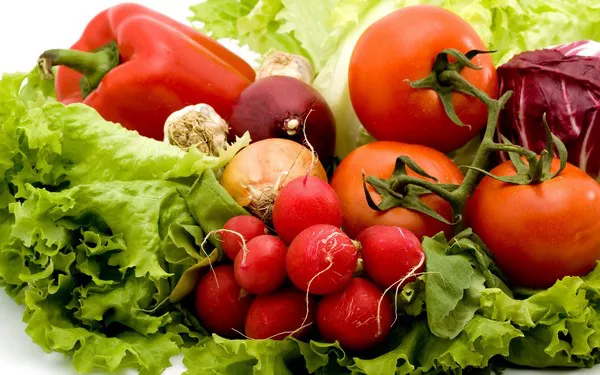Vegetables are the cornerstone of a healthy diet, providing essential vitamins, minerals, fiber, and phytonutrients that support overall health and well-being. While all vegetables offer nutritional benefits, some stand out for their exceptional nutrient density and health-promoting properties. In this comprehensive guide, we’ll delve into the world of vegetables to uncover the most nutritious options, exploring their health benefits, culinary versatility, and practical tips for incorporating them into your diet.
7 Most Nutritious Vegetables
1. Kale: The King of Nutrient-Rich Greens:
Kale is often hailed as one of the most nutrient-dense vegetables on the planet, packed with vitamins, minerals, and antioxidants that promote optimal health. This leafy green powerhouse is rich in vitamin K, vitamin A, vitamin C, manganese, and fiber, among other essential nutrients.
Health Benefits:
Kale is associated with numerous health benefits, including improved heart health, enhanced bone health, and reduced risk of chronic diseases such as cancer and diabetes. Its high antioxidant content helps protect against oxidative stress and inflammation, while its fiber promotes digestive health and aids in weight management.
Culinary Versatility:
Kale can be enjoyed raw in salads, sautéed as a side dish, blended into smoothies, or baked into crispy kale chips. Its robust flavor and sturdy texture make it a versatile ingredient in a variety of dishes, from soups and stews to pasta and grain bowls.
Practical Tips:
To maximize the nutritional benefits of kale, choose organic varieties whenever possible to minimize exposure to pesticides and maximize nutrient content. Remove the tough stems before cooking or blending to improve texture and digestibility. Incorporate kale into your meals regularly to enjoy its impressive health benefits and add a vibrant burst of color and flavor to your plate.
2. Spinach: Popeye’s Favorite Nutrient-Rich Green:
Spinach is another nutrient-rich leafy green beloved for its mild flavor and versatility in cooking. It is packed with vitamins, minerals, and antioxidants, including vitamin K, vitamin A, vitamin C, iron, and folate.
Health Benefits:
Spinach is known for its role in promoting eye health, bone health, and cardiovascular health. Its high vitamin K content supports bone density and blood clotting, while its antioxidants help protect against age-related macular degeneration and other eye conditions. Spinach is also valued for its iron content, which helps prevent anemia and supports energy metabolism.
Culinary Versatility:
Spinach can be enjoyed raw in salads, wilted into soups and stews, sautéed as a side dish, or blended into smoothies and sauces. Its tender texture and mild flavor make it a versatile addition to a wide range of dishes, from omelets and quiches to pizzas and sandwiches.
Practical Tips:
To retain the maximum nutritional value of spinach, opt for fresh, vibrant leaves and avoid overcooking, as prolonged cooking can lead to nutrient loss. Incorporate spinach into your meals regularly to enjoy its health benefits and add a boost of vitamins and minerals to your diet.
3. Broccoli: The Nutrient-Packed Cruciferous Vegetable:
Broccoli is a nutritional powerhouse prized for its high vitamin and mineral content, as well as its unique array of health-promoting compounds. It is rich in vitamin C, vitamin K, folate, fiber, and antioxidants such as sulforaphane and glucosinolates.
Health Benefits:
Broccoli is associated with numerous health benefits, including reduced risk of cancer, improved heart health, and enhanced digestive health. Its high fiber content supports digestive regularity and helps lower cholesterol levels, while its antioxidants help protect against oxidative stress and inflammation.
Culinary Versatility:
Broccoli can be enjoyed raw in salads, steamed as a side dish, roasted as a flavorful vegetable medley, or blended into soups and sauces. Its crunchy texture and mild flavor make it a versatile ingredient in a variety of dishes, from stir-fries and pasta dishes to casseroles and gratins.
Practical Tips:
To preserve the maximum nutritional value of broccoli, opt for fresh, firm florets and avoid overcooking, as prolonged cooking can lead to nutrient loss. Incorporate broccoli into your meals regularly to enjoy its impressive health benefits and add a burst of color and flavor to your plate.
4. Sweet Potatoes: Nature’s Sweet and Nutrient-Dense Tubers:
Sweet potatoes are a nutritional powerhouse prized for their vibrant color, sweet flavor, and impressive nutrient profile. They are rich in vitamins, minerals, fiber, and antioxidants such as beta-carotene.
Health Benefits:
Sweet potatoes are known for their role in promoting eye health, immune function, and gut health. Their high beta-carotene content supports vision and skin health, while their fiber promotes digestive regularity and helps regulate blood sugar levels. Sweet potatoes are also valued for their antioxidants, which help protect against oxidative stress and inflammation.
Culinary Versatility:
Sweet potatoes can be enjoyed roasted as a side dish, mashed as a flavorful puree, baked as a hearty main course, or spiralized into noodles for a nutritious alternative to pasta. Their sweet flavor and creamy texture make them a versatile ingredient in a variety of dishes, from soups and salads to desserts and baked goods.
Practical Tips:
To maximize the nutritional value of sweet potatoes, opt for organic varieties whenever possible to minimize exposure to pesticides and maximize nutrient content. Leave the skin on when cooking to retain the maximum fiber and antioxidant content. Incorporate sweet potatoes into your meals regularly to enjoy their impressive health benefits and add a touch of natural sweetness to your plate.
5. Carrots: Vibrant Roots Packed with Nutrients:
Carrots are brightly colored root vegetables prized for their sweet flavor and impressive nutritional profile. They are rich in beta-carotene, vitamin K1, potassium, and fiber, making them a valuable addition to any diet.
Health Benefits:
Carrots are known for their role in promoting eye health, immune function, and skin health. Their high beta-carotene content supports vision and may help reduce the risk of age-related macular degeneration, while their antioxidants help protect against oxidative stress and inflammation. Carrots are also valued for their fiber content, which promotes digestive regularity and helps regulate blood sugar levels.
Culinary Versatility:
Carrots can be enjoyed raw as a crunchy snack, roasted as a flavorful side dish, pureed into soups and sauces, or grated into salads and slaws. Their sweet flavor and vibrant color make them a versatile ingredient in a variety of dishes, from stir-fries and curries to cakes and muffins.
Practical Tips:
To maximize the nutritional value of carrots, opt for fresh, firm roots with vibrant orange color and avoid overcooking, as prolonged cooking can lead to nutrient loss. Leave the skin on when cooking to retain the maximum fiber and antioxidant content. Incorporate carrots into your meals regularly to enjoy their impressive health benefits and add a pop of color and sweetness to your plate.
6. Bell Peppers: Colorful Capsicums Bursting with Nutrients:
Bell peppers, also known as capsicums, are colorful vegetables prized for their crunchy texture and sweet flavor. They come in a variety of vibrant colors, including red, yellow, orange, and green, and are rich in vitamins, minerals, and antioxidants.
Health Benefits:
Bell peppers are known for their role in promoting eye health, immune function, and skin health. They are rich in vitamin C, vitamin A, vitamin K1, potassium, and antioxidants such as beta-carotene and lutein, which help protect against oxidative stress and inflammation. Bell peppers are also valued for their fiber content, which promotes digestive regularity and helps regulate blood sugar levels.
Culinary Versatility:
Bell peppers can be enjoyed raw as a crunchy snack, sliced into salads and sandwiches, roasted as a flavorful side dish, or stuffed with savory fillings for a hearty main course. Their sweet flavor and vibrant color make them a versatile ingredient in a variety of dishes, from fajitas and stir-fries to pizzas and pasta dishes.
Practical Tips:
To maximize the nutritional value of bell peppers, opt for fresh, firm peppers with vibrant color and avoid overcooking, as prolonged cooking can lead to nutrient loss. Leave the seeds and membranes intact when cooking to retain the maximum fiber and antioxidant content. Incorporate bell peppers into your meals regularly to enjoy their impressive health benefits and add a burst of color and flavor to your plate.
7. Brussels Sprouts: Miniature Cabbages Packed with Nutrition:
Brussels sprouts are small, green cruciferous vegetables prized for their nutty flavor and dense nutritional profile. They are rich in vitamins, minerals, fiber, and antioxidants, making them a valuable addition to any diet.
Health Benefits:
Brussels sprouts are known for their role in promoting heart health, digestive health, and immune function. They are rich in vitamin K1, vitamin C, vitamin A, folate, and fiber, which help support bone health, reduce inflammation, and promote digestive regularity. Brussels sprouts are also valued for their antioxidants, which help protect against oxidative stress and inflammation.
Culinary Versatility:
Brussels sprouts can be enjoyed roasted as a flavorful side dish, sautéed as a savory accompaniment, shredded into salads and slaws, or steamed as a nutritious addition to meals. Their nutty flavor and tender texture make them a versatile ingredient in a variety of dishes, from gratins and casseroles to stir-fries and grain bowls.
Practical Tips:
To maximize the nutritional value of Brussels sprouts, opt for fresh, firm sprouts with tight, compact leaves and avoid overcooking, as prolonged cooking can lead to nutrient loss. Trim any discolored or damaged outer leaves before cooking to improve flavor and appearance. Incorporate Brussels sprouts into your meals regularly to enjoy their impressive health benefits and add a delicious and nutritious element to your plate.
See Also: The World’s Most Expensive Bonsai
Conclusion:
Incorporating nutrient-rich vegetables into your diet is essential for promoting overall health and well-being. From leafy greens like kale and spinach to cruciferous vegetables like broccoli and nutrient-dense tubers like sweet potatoes, the most nutritious vegetables offer a wealth of vitamins, minerals, fiber, and antioxidants that support optimal health. By incorporating a variety of nutrient-rich vegetables into your meals regularly, you can nourish your body with essential nutrients and enjoy a vibrant, colorful, and delicious diet that promotes health and vitality.
You Might Be Interested In:


























